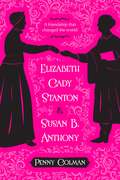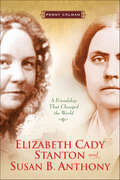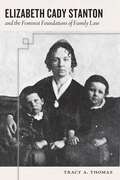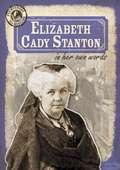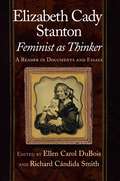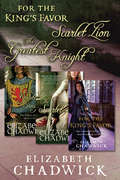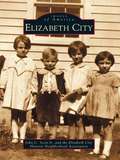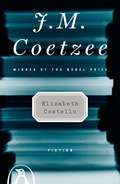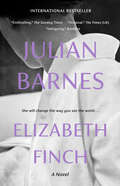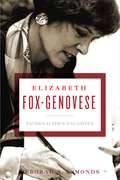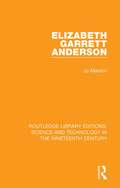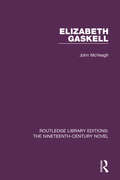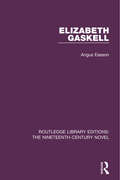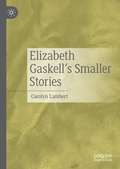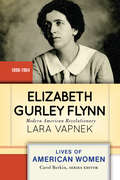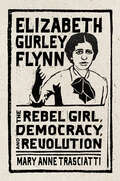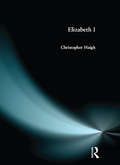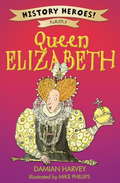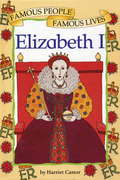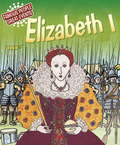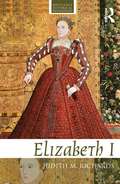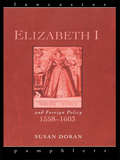- Table View
- List View
Elizabeth Cady Stanton and Susan B. Anthony: A Friendship That Changed the World
by Penny Colman<p>In the Spring of 1851 two women met on a street corner in Seneca Falls, New York—Elizabeth Cady Stanton, a thirty-five year old mother of four boys, and Susan B. Anthony, a thirty-one year old, unmarried, former school teacher. Immediately drawn to each other, they formed an everlasting and legendary friendship. Together they challenged entrenched beliefs, customs, and laws that oppressed women and spearheaded the fight to gain legal rights, including the right to vote despite fierce opposition, daunting conditions, scandalous entanglements and betrayal by their friends and allies. <p>Weaving events, quotations, personalities, and commentary into a page-turning narrative, Penny Colman tells this compelling story and vividly portrays the friendship between Elizabeth Cady Stanton and Susan B. Anthony, a friendship that changed history.</p>
Elizabeth Cady Stanton and Susan B. Anthony: A Friendship That Changed the World
by Penny ColmanWeaving events, quotations, personalities, and commentary into a page-turning narrative, Penny Colman's Elizabeth Cady Stanton and Susan B. Anthony vividly portrays a friendship that changed history. In the Spring of 1851 two women met on a street corner in Seneca Falls, New York—Elizabeth Cady Stanton, a thirty-five year old mother of four boys, and Susan B. Anthony, a thirty-one year old, unmarried, former school teacher. Immediately drawn to each other, they formed an everlasting and legendary friendship. Together they challenged entrenched beliefs, customs, and laws that oppressed women and spearheaded the fight to gain legal rights, including the right to vote despite fierce opposition, daunting conditions, scandalous entanglements and betrayal by their friends and allies.
Elizabeth Cady Stanton and the Feminist Foundations of Family Law
by Tracy A. ThomasThomas Byers Memorial Outstanding Publication Award from the University of Akron Law Alumni AssociationMuch has been written about women’s rights pioneer Elizabeth Cady Stanton. Historians have written her biography, detailed her campaign for woman’s suffrage, documented her partnership with Susan B. Anthony, and compiled all of her extensive writings and papers. Stanton herself was a prolific author; her autobiography, History of Woman Suffrage, and Woman’s Bible are classics. Despite this body of work, scholars and feminists continue to find new and insightful ways to re-examine Stanton and her impact on women’s rights and history. Law scholar Tracy A. Thomas extends this discussion of Stanton’s impact on modern-day feminism by analyzing her intellectual contributions to—and personal experiences with—family law. Stanton’s work on family issues has been overshadowed by her work (especially with Susan B. Anthony) on woman’s suffrage. But throughout her fifty-year career, Stanton emphasized reform of the private sphere of the family as central to achieving women’s equality. By weaving together law, feminist theory, and history, Thomas explores Stanton’s little-examined philosophies on and proposals for women’s equality in marriage, divorce, and family, and reveals that the campaigns for equal gender roles in the family that came to the fore in the 1960s and ’70s had nineteenth-century roots. Using feminist legal theory as a lens to interpret Stanton’s political, legal, and personal work on the family, Thomas argues that Stanton’s positions on divorce, working mothers, domestic violence, childcare, and many other topics were strikingly progressive for her time, providing significant parallels from which to gauge the social and legal policy issues confronting women in marriage and the family today.
Elizabeth Cady Stanton in Her Own Words
by Nicole SheaFor over 50 years, Elizabeth Cady Stanton was one of the most influential leaders of the women's rights movement of the 1800s. In this book, abundant with interesting photographs and images, readers are given a glimpse of Stanton's public and personal life through her own writings. Her friendship with Susan B. Anthony, work for the women's rights convention of 1848, and connection with the antislavery movement are especially highlighted. Sidebars and fact boxes offer more about this period in US and world history.
Elizabeth Cady Stanton, Feminist as Thinker: A Reader in Documents and Essays
by Ellen Carol DuBois and Richard Cándida SmithMore than one hundred years after her death, Elizabeth Cady Stanton still stands—along with her close friend Susan B. Anthony—as the major icon of the struggle for women’s suffrage. In spite of this celebrity, Stanton’s intellectual contributions have been largely overshadowed by the focus on her political activities, and she is yet to be recognized as one of the major thinkers of the nineteenth century.Here, at long last, is a single volume exploring and presenting Stanton’s thoughtful, original, lifelong inquiries into the nature, origins, range, and solutions of women’s subordination. Elizabeth Cady Stanton, Feminist as Thinker reintroduces, contextualizes, and critiques Stanton’s numerous contributions to modern thought. It juxtaposes a selection of Stanton’s own writings, many of them previously unavailable, with eight original essays by prominent historians and social theorists interrogating Stanton’s views on such pressing social issues as religion, marriage, race, the self and community, and her place among leading nineteenth century feminist thinkers. Taken together, these essays and documents reveal the different facets, enduring insights, and fascinating contradictions of the work of one of the great thinkers of the feminist tradition.Contributors: Barbara Caine, Richard Cándida Smith, Ellen Carol DuBois, Ann D. Gordon, Vivian Gornick, Kathi Kern, Michele Mitchell, and Christine Stansell.
Elizabeth Chadwick Bundle: The Greatest Knight, The Scarlet Lion, and For the King's Favor
by Elizabeth ChadwickHailed by the Times of London as "an author who makes historical fiction come gloriously alive", Elizabeth Chadwick is a gifted storyteller who captures the passion, deceit, honor, and heartbreak of Medieval England like none other. Now, get three books from historical fiction powerhouse Elizabeth Chadwick at one low price. This bundle includes The Greatest Knight, The Scarlet Lion, and For the King's Favor, each on their own a shining example of a novelist at the peak of her powers. Taken collectively, you'll witness an era you won't want to leave. "Just like a fine wine Chadwick is to be savored all the way down to the last drop... what more could a reader ask for?" --Historically Obsessed. "Elizabeth Chadwick is a gifted novelist and a dedicated researcher... I rank her with such historical novelist stars as Dorothy Dunnett and Anya Seton." --Sharon Kay Penman, New York Times bestselling author of Devil's Brood. "Elizabeth Chadwick is to Medieval England what Philippa Gregory is to the Tudors and the Stuarts, and Bernard Cornwell is to the Dark Ages." --Books Monthly.
Elizabeth City
by Elizabeth City Historic Neighborhood Association John C. Scott Jr.Located in Eastern North Carolina, Elizabeth City exists today as a favorite stop among boaters and travelers, while remaining a beloved community for its residents. The city possesses a distinct character, flavored by warm weather, friendly residents, a revitalized waterfront, and historic architecture. With the many waterways that surround the area, such as the Pasquotank River, the Albemarle Sound, and various other creeks and streams, it is not surprising that the city's history has been greatly shaped by such canals. With the completion of the Dismal Swamp Canal in 1805, which connected these waterways with Norfolk's port, Elizabeth City residents were able to offer their agricultural and lumber goods to the world.Elizabeth City is a volume that shares with readers keepsakes from the town's defining years. Vintage photographs, many taken by well-known Elizabeth City photographer William Henry Zoeller, come alive through descriptive text. Spotlighted are the many residents who contributed to the city's heritage, whether publicly or in a smaller, more personal fashion, including Dr. A.L. Pendleton and his family in the city's first automobile and the Wright Brothers who stayed in the city for a while before making their way to Kitty Hawk. Other images offer glimpses of the ever-changing streets and waterfront, as well as the various forms of architecture that have lined both over the years.
Elizabeth Costello: Fiction
by J. M. CoetzeeJ.M. Coetzee's latest novel, The Schooldays of Jesus, will soon be available from VikingSince 1982, J. M. Coetzee has been dazzling the literary world. After eight novels that have won, among other awards, two Booker Prizes, and most recently, the Nobel Prize, Coetzee has once again crafted an unusual and deeply affecting tale. Told through an ingenious series of formal addresses, Elizabeth Costello is, on the surface, the story of a woman?s life as mother, sister, lover, and writer. Yet it is also a profound and haunting meditation on the nature of storytelling.
Elizabeth Finch: A novel
by Julian BarnesFrom the Booker Award-winning writer, a swift narrative that turns on the death of a vivid and particular woman, and becomes the occasion for a man's deeper examination of love, friendship and the mysteries of biography."I'll remember Elizabeth Finch when most other characters I've met this year have faded." —John Self, The Times (UK)This novel of unrequited platonic love takes aim at the singular character of the exacting Elizabeth Finch. When Neil, adrift in his 30s, takes her adult education class on Culture and Civilization, he becomes deeply fascinated by this private, withholding yet commanding woman. While other personal relationships and even his children drift from his grasp, Neil hangs tight to Finch and her unorthodox application of history and philosophy to the practical matters of daily living. As much as he wants to figure her out intellectually, he want to please her. Both are impossible.In Neil's story, readers are treated to everything they cherish in Barnes: his eye for the unconventional forms love can take, a compelling swerve into nonfiction (this time through Neil's obsessive study of Julian the Apostate, following the trail of crumbs Elizabeth Finch has left for him), and the forcefully moving undercurrent of history and biography as both nourishment and guide in our daily lives. Finch is a character who challenges the reader as much as her students to think for themselves, and leaves us searching for a way to deal with one of her simplest of ideas: "Some things are up to us, and some things are not up to us."
Elizabeth Fox-Genovese: Paternalism's Daughter
by Deborah A. SymondsIn her provocative politics, which confront us still with the complexities of left and right, and her constant search for her place in the world, Fox-Genovese’s story resonates more strongly than ever.
Elizabeth Garrett Anderson (Routledge Library Editions: Science and Technology in the Nineteenth Century #5)
by Jo MantonFirst published in 1965. In 1865, a woman first obtained a legal qualification in this country as physician and surgeon. Elizabeth Garrett surprised public opinion by the calm obstinacy with which she fought for her own medical education and that of the young women who followed her. This full biography is based largely on unpublished material from the hospitals and medical schools where Elizabeth Garrett Anderson worked, and the private papers of the Garrett and Anderson families. This title will be of great interest to history of science students.
Elizabeth Gaskell (Routledge Library Editions: The Nineteenth-Century Novel #26)
by John McVeaghFirst published in 1970, this study demonstrates both the range and essential unity of the works of Mrs. Gaskell. The author analyses the novels of social criticism, the biography of Charlotte Brontë and the novels of country life as distinct expressions of her genius, commenting on recurrent themes, typical methods of presentation and consistent attitudes as they appear in each of the works. The differences of subject and intention between the three kinds of writing will be seen in the extracts which indicate the range of her ability and interests. The final section summarises her range and success and failure. This book will be of interest to students of literature and sociological history.
Elizabeth Gaskell: Electronic Edition (Routledge Library Editions: The Nineteenth-Century Novel #11)
by Angus EassonFirst published in 1979, this book looks at every aspect of the life and work of Elizabeth Gaskell, including her lesser known novels and writings — especially those concerning life in the industrial north of Victorian England. It shows how her work springs from a culture and society which pervades all she thought and wrote. An opening chapter explores her religion, culture, friendships and family. The major works are considered in turn and background material relevant to the novels’ industrial scenes is presented. The process of literary creation is charted in material drawn from letters and by examination of the manuscripts. Her short stories, journalism and letters are also considered.
Elizabeth Gaskell’s Smaller Stories
by Carolyn LambertThis book re-locates Elizabeth Gaskell’s ‘smaller stories’ in the literary and cultural context of the nineteenth century. While Gaskell is recognised as one of the major novelists of her time, the short stories that make up a large proportion of her published work have not yet received the critical attention they deserve. This study re-claims them as an indispensable part of her literary output that enables us to better contextualize and assess her achievement holistically as a highly-skilled woman of letters. The periodicals in which Gaskell’s shorter pieces were published offer a microcosm of nineteenth-century society, and Gaskell took full advantage of the medium to apply a consistent and barbed challenge to cultural and gendered constructs of roles and social behaviour. Although her eminently readable prose still flows easily in her short stories, it is less likely to elide the sharp corners of domestic violence, the disabling experiences of women, the pain of death and loss, and the complications of family life.
Elizabeth Gurley Flynn: The Rebel Girl, Democracy, and Revolution (CERES: Rutgers Studies in History)
by Mary Anne TrasciattiElizabeth Gurley Flynn was involved in almost every major campaign of the U.S. Left in the first two thirds of the twentieth century. An outstanding orator, writer, and tactician, Flynn is one of the most important figures in the history of the American labor movement. Inspired by the Irish freedom struggle and appalled by the exploitation and grinding poverty she saw around her, she devoted her life to the advancement of civil liberties. Here, Mary Anne Trasciatti traces Flynn’s personal and political life to explore the broader social issues of a fraught era. Born in 1890, Flynn began her activist career by joining the Industrial Workers of the World (IWW) when she was just sixteen, and she ended it as the first female chair of the American Communist Party, a position she held from 1961 until her death in 1964. In the intervening years she organized workers into unions, led strikes, championed women’s rights, supported anti-imperialist movements around the globe, protested deportation, advocated for prison reform, and fought for Black liberation. Above all, she showed absolute devotion to workers and their struggles. Slandered as an “un-American” in the anticommunist fervor of the 1940s and 1950s, Flynn was eventually ousted from the very organization she helped found, the American Civil Liberties Union, and imprisoned for two years. Though her own movement abandoned her, her commitment to the cause never wavered. This stirring biography illuminates Flynn’s inspiring life and worldview and returns her to her rightful place at the heart of labor and civil liberties history.
Elizabeth I
by Christopher HaighThe reign of Elizabeth I was one of the most important periods of expansion and growth in British history - the "Golden Age". This celebrated and influential study reconsiders how Elizabeth achieved this, and the ways in which she exercised her power. It analyses the nature of her power through an examination of her relations with Parliament, the Council of Ministers, the Church, the nobility, military and the English people themselves.
Elizabeth I
by Rupert Van Wyk Damian HarveyElizabeth I ruled during a turbulent time in Tudor history. Find out about her highs and lows from being imprisoned in the Tower of London to inspiring victory over the Spanish Armada. Discover the stories of people who have helped to shape history, ranging from early explorers such as Christopher Columbus to more modern figures like Tim Berners-Lee, inventor of the World Wide Web. These chapter books combine historical fact with engaging narrative and humourous illustration, perfect for the newly independent reader.
Elizabeth I
by Wallace T. MaccaffreyIn this major biography, MacCaffrey focuses on Elizabeth's career as a practicing politician, taking into account her formative personal experiences, her temperament, her own view of her role, and the constraints she frequently faced.
Elizabeth I (Famous People, Famous Lives #11)
by Harriet CastorExciting stories about famous people, outlining their lives and the important events which made them memorable. Every page features easy-to-follow text and a black-and-white line drawing to help bring these events to life. Each title gives further facts about the famous person and the times in which he or she lived, plus a comprehensive time line detailing key dates. When Elizabeth I becomes queen, she is determined to be a great Tudor queen - and do it on her own! She rules for almost 45 years, beats the Spanish Armada and wins the love of her people. Find out all about the life of Elizabeth I with this story that is packed with all the facts.
Elizabeth I (Famous People, Great Events #3)
by Harriet CastorWhen Elizabeth I becomes queen, she is determined to be a great Tudor queen - and do it on her own! She rules for almost 45 years, beats the Spanish Armada and wins the love of her people. Find out all about the life of Elizabeth I with this story that is packed with all the facts and colourful pictures.This book is part of a series of picture books, Famous People, Great Events, which are suitable for ages 6-12. They tell the stories of famous men and women and great events in history and can be used to study the primary history curriculum. Written by successful authors, they are enjoyable reads which are packed with facts and colourful illustrations.
Elizabeth I (History Heroes #3)
by Damian HarveyElizabeth I ruled during a turbulent time in Tudor history. Find out about her highs and lows from being imprisoned in the Tower of London to inspiring victory over the Spanish Armada.Discover the stories of people who have helped to shape history, ranging from early explorers such as Christopher Columbus to more modern figures like Tim Berners-Lee, inventor of the World Wide Web.These chapter books combine historical fact with engaging narrative and humourous illustration, perfect for the newly independent reader.
Elizabeth I (Routledge Historical Biographies)
by Judith M. RichardsElizabeth I was Queen of England for almost forty-five years. The daughter of Henry VIII and Ann Boleyn, as an infant she was briefly accepted as her father’s heir. After her mother was executed at her father’s command she was declared illegitimate and led a sometimes scandalous existence until her accession to the throne at the age of twenty-five. Elizabeth oversaw a vibrant age of exploration and literature and established herself, the "Virgin Queen", a national icon that lives on in the popular imagination. But Elizabeth was England’s second female monarch, and was greatly influenced by the experiences and mistakes of the reign of her half-sister, Mary I, before her. During her reign, Elizabeth had to perform a complicated balancing act in religious matters. As religious wars raged in Europe, Elizabeth herself a moderate Protestant, had to manage an inherited Catholic realm and the demands of zealous Protestants. The importance of such familiar features of Elizabeth’s reign as the presence in England of Mary Queen of Scots and her enduring efforts to take the throne, the Spanish armada, and the origins of English colonial expansion beyond the British archipelago all receive fresh attention in this engaging book. This new biography sheds light on Elizabeth’s early life, influences and on her personal religious beliefs as well as examining her reign, politics and reassesses Elizabeth’s reluctance to marry, a matter for which she has been much praised, but which is here judged one of the second queen regnant’s more problematic decisions. Judith M. Richards takes an objective and rounded view of Elizabeth’s whole life and provides the perfect introduction for students and general readers alike.
Elizabeth I and Foreign Policy, 1558-1603
by Susan DoranAt her accession in 1558 Elizabeth I inherited a troublesome legacy with a long history of wars against France and Scotland. This international situation was becoming a huge financial burden on the English crown and economy.Elizabeth I and Foreign Policy describes and assesses England's foreign policy during the second half of the sixteenth century. It includes coverage of Elizabeth's relations with foreign powers, the effect of Reformation on foreign affairs, Elizabeth's successs as a stateswoman and the war with Spain.
Elizabeth I and Ireland
by Brendan Kane Valerie Mcgowan-DoyleThe last generation has seen a veritable revolution in scholarly work on Elizabeth I, on Ireland, and on the colonial aspects of the literary productions that typically served to link the two. It is now commonly accepted that Elizabeth was a much more active and activist figure than an older scholarship allowed. Gaelic elites are acknowledged to have had close interactions with the crown and continental powers; Ireland itself has been shown to have occupied a greater place in Tudor political calculations than previously thought. Literary masterpieces of the age are recognised for their imperial and colonial entanglements. Elizabeth I and Ireland is the first collection fully to connect these recent scholarly advances. Bringing together Irish and English historians, and literary scholars of both vernacular languages, this is the first sustained consideration of the roles played by Elizabeth and by the Irish in shaping relations between the realms.
